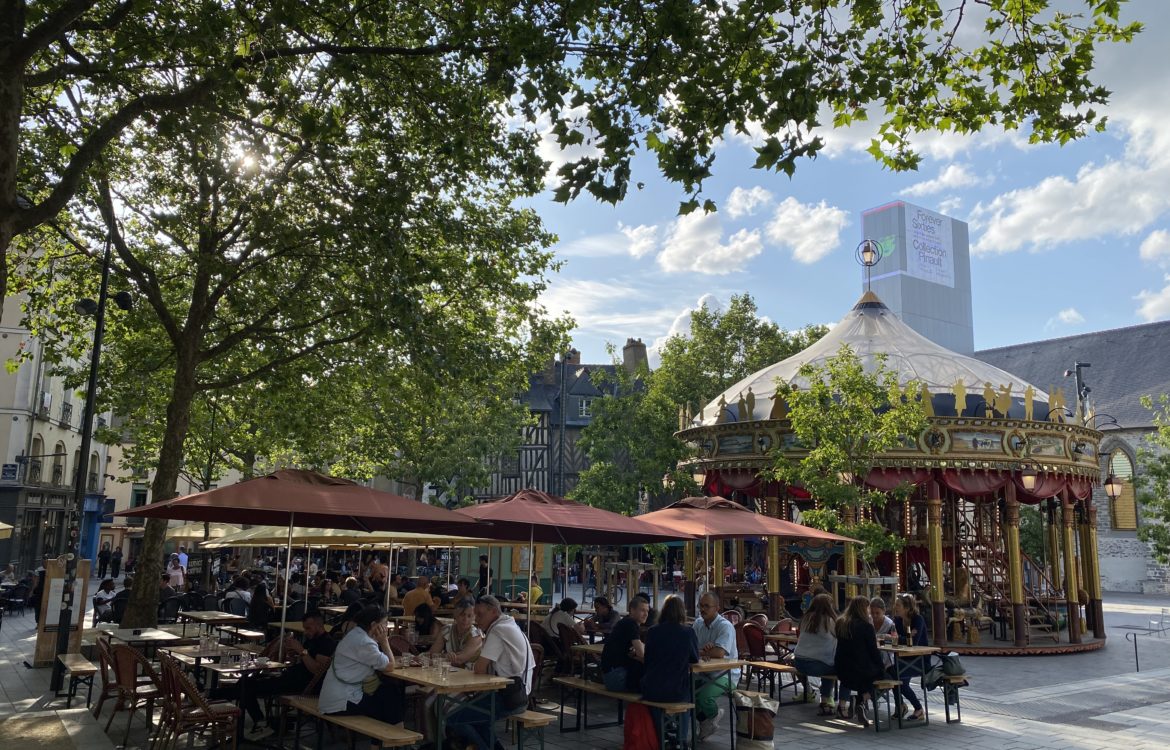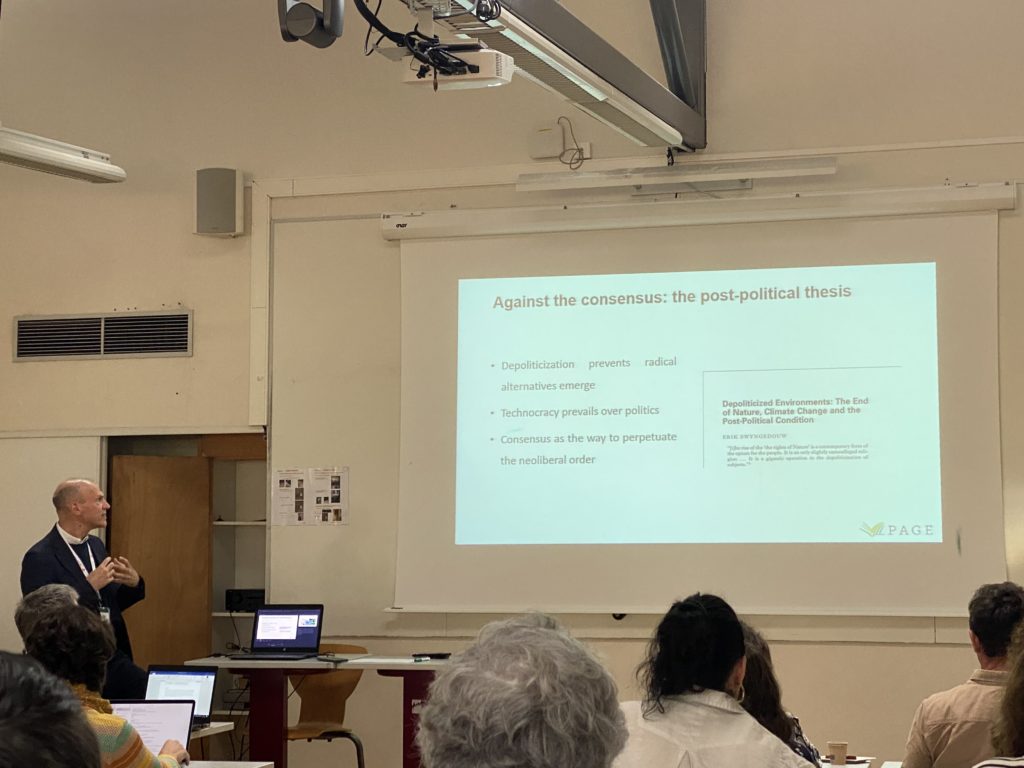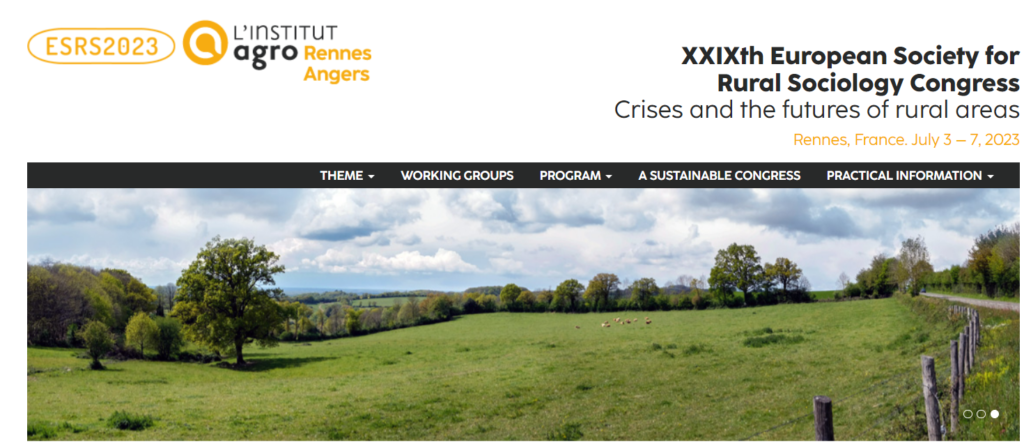
The PAGE group took part at the XXIXth ESRS Congress 2023 in Rennes
Written by Daniel Alpízar Rojas and Tarek Allali.
The 29th European Society for Rural Sociology Congress, focused on ‘Crisis and the Futures of Rural Areas’, took place in Rennes (France) from July 3rd to 7th, 2023. The event was hosted by L’Institut Agro Rennes-Angers and featured 32 working groups (WGs).
The crises caused by the rapid changes in food systems impacting rural areas was addressed during the Congress. The discussions questioned whether these crises increased vulnerability or if these areas have always been in crisis. Despite the concepts of resilience, adaptation, restoration, sustainability, solidarity, and wellbeing being related to these issues for decades, the congress aimed to evaluate if these concepts are still useful to address current and future challenges. Additionally, the congress aimed to explore whether there is a need to rethink brand-new concepts or approaches, and the role of rural sociology knowledge.
During the congress, many Ph.D. students and researchers from the PAGE group participated in the discussion, sharing methodologies, approaches, results, and knowledge from experiences gained by the diverse number of projects the research group takes part in and from the different sets of research held in the Department.
Prior to the main activities of the conference, three workshops were organized, targeting PhD students. These workshops covered essential topics for early-stage researchers: ‘Publishing Workshop,’ ‘Methodologies in Rural Sociology Research,’ and ‘Artificial Intelligence Use in Research,’ with expert moderation provided by Dr. Menelaos Gkartzios, Dr. Bianka Plüschke-Altof, and Dr. Pavel Pospech, respectively.
Prof. Gianluca Brunori who was among the managers and facilitators for the WG15 ‘Food systems in crisis: intersections between conflict, transformation and the post-political, on the 4th of July, addressed the scientific audience with a contribution about “Transformative food policies in times of ‘permacrisis’” where he argued that the world’s sequence of crises has given rise to the term ‘permacrisis’, referring to a state where crises become the norm rather than exceptions, signifying their permanence in our global systems. Permacrisis leads to high uncertainty, fragility, and unpredictability, challenging transformative policies and poses dilemmas between resilience and sustainability. He discussed how integrating permacrisis into the concept of transition impacts sustainable food systems. COVID-19 and Ukraine crises have not only questioned neoliberal dogmas like free trade and state intervention but also weakened the ‘sustainability consensus,’ causing divisions between those advocating ‘building back better’ through transformative policies and those favoring delayed transitions or even regression. The field of ‘building back better’ exhibits theoretical and political vulnerabilities, as sustainability studies overlook the centrality of preparedness for multiple shocks and stresses. A new consensus framework linking sustainability, resilience, mitigation, adaptation, stability, and change is vital to avoid depoliticization. Topics like waste reduction, food poverty, agroecology, and digitalization will be examined through this lens, along with the role of science-policy-society interfaces in addressing wicked problems.

Prof. Francesca Galli who was also among the WG15 managers and facilitators, on the 6th of July, gave a presentation about ‘Building shared food system representations: food system mapping as a tool for policies’ with professor Gianluca Brunori as co-author. She argued that systems approaches are gaining recognition as the most suitable methods to address current food production, distribution, and consumption challenges and find solutions. Policy-related frameworks support understanding the critical relationships among components affecting sustainability outcomes by promoting common systems representations. These representations identify the decision-making “visibility space” with essential variables for policy interventions. However, practical use and translation of systems approaches into decision-making are complex and often biased by vested interests or limited to controllable aspects, disregarding crucial problem aspects. The ongoing debate illustrates how different representations of food systems lead to disagreements, exemplified by controversies over front-of-pack nutrition labeling and reducing animal product consumption. Researchers and policymakers play a vital role in creating inclusive representations that facilitate open discussions for potential solutions, drawing on food system mapping methods.
Other contributions from the PAGE group by working group were:
WG4: The Role of Arts and Culture for a Sustainable Future in Rural Areas
– Sonia Massari: Designers, dreamers, envisioners, facilitators: the multiple roles of the designer in co-creative projects for rural areas
WG5: The Sociology of Rural Entrepreneurship
– Mariagiulia Mariani: Rural entrepreneurship in the Organic Fruit Breeding sector through the lens of Social Innovation
WG9: Community action in critical contexts
– Livia Ortolani: Digitalization pathways to support rural communities actions in critical context
WG13: Agroecological transition towards equitable, sustainable and resilient agri-food systems at multiple levels: from family farm communities to organic districts and agroecological clusters
– Michele Moretti: Value chains’ contribution to sustainability of socio-ecological systems in mountain areas
-: The role of the retail sector in sustaining demand for agro-biodiverse food grown in agro-ecological conditions.
WG15: Food systems in crisis: intersections between conflict, transformation and the post-political
– Daniel Alpízar Rojas: Identification of inclusive supply chain in the food system: A case study of Rwamwanja Refugee Settlement in Uganda
WG16: Transdisciplinary practices to drive transitions to resilient and sustainable food and farming systems to accompany the exit of political crises?
– Marina Knickel, postdoctoral fellow at Konrad Lorenz Institute for Evolution and Cognition Research (Klosterneuburg, Austria) A decade of Living Labs: Researchers’ reflections on the approach and their own role in shaping TD processes can help accelerate sustainability transitions in rural areas, co-authored with Sabrina Arcuri and Gianluca Brunori.
WG21: Responding to present and future crises in rural areas: good practice methodologies and approaches
– Tarek Allali: Agri-Food Value Chains’ Sustainability Assessment – A New Guiding Analytical Framework

This event allowed the PAGE group not only to share their work but to attend and grasp the latest research in Europe and other countries from around the globe about rural sociology, and participated in arguments and debates the scientific community has about how to face the new challenges in agriculture and more specifically in rurality, and why the old challenges persist.
Climate change, migration, famine crisis, global economy, and more topics related to food systems are among new challenges where a diversity of approaches were shared mostly related to sustainability and resilience, and where the integration of the concept of transformation of food systems was in the core of the discussions. Some presenters at the conference concluded that the old challenges in rural areas persist because the problem is within the system, and the solution is to have a normative and structural approach rather than a positive one, nevertheless, most of the participants agreed to continue finding solutions and understanding of the complexity of rurality and agriculture to assure a long-lasting planet for the generations to come.
Heading picture Ph. Credits: Marina Knickel.

